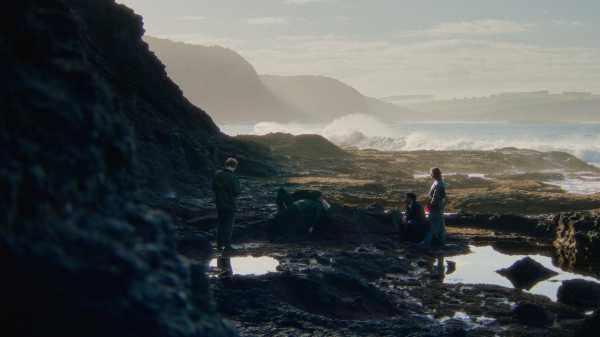
What’s exciting about the annual New Directors/New Films series, which runs through April 9th at MOMA and at Film at Lincoln Center, is the discovery of filmmakers, usually young ones, who pose new questions and seek new answers to the practice of filmmaking itself. It’s what Dwayne LeBlanc does in the venue-confined but far-reaching short film “Civic” (screening tomorrow and Saturday), which I wrote about in the current issue of The New Yorker. And it’s what the Australian filmmaker Alena Lodkina does in her second feature, “Petrol,” which plays on Thursday and Saturday. Lodkina borrows one of the most familiar of young filmmakers’ tropes—the drama of a film student struggling to complete a thesis film—and transforms it into something as original as it is personal.
The originality of “Petrol” comes via ricochet. Lodkina bounces her theme off one of the monumental achievements in modern cinema: the œuvre of Jacques Rivette. She transforms his obsessions with cinematic history into a confrontation with personal history, his visions of a comprehensive network of hidden connections into an intimate story of an uncertain quest. She grabs one of Rivette’s prime formats—the mirroring, doubling, and convergent relationships of two women, as in such films as “Le Pont du Nord” and “Céline and Julie Go Boating”—and adds to it the ethical challenges of her own artistic practice.
“Petrol” begins when a college filmmaking student named Eva (Nathalie Morris) turns up with recording equipment on a rocky beachfront, where a small crew of other young filmmakers is making a movie (something stylized and vampiric). For Eva’s thesis film, she is working on an experimental documentary portrait of an older Russian woman named Bella (Becky Voskoboinik), a woman of a mystical bent; Eva is collecting ocean sounds as an adornment to the film’s soundtrack. She is skeptical of her film-school studies, telling her mother (Inga Romantsova) that filmmaking can’t be taught: “It’s life; you just have to live.” But, as her mother recognizes, the hardworking but solitary Eva doesn’t seem to be doing much living. Circumstances conspire to help: wandering in the evening near a café, Eva sees a woman drop a necklace and walk off with a friend. Eva (in a touch as much from the Éric Rohmer universe as the Jacques Rivette one) picks it up and follows the woman in order to return it; the trek brings her to a party, where she meets the woman, Mia (Hannah Lynch), the vampire-movie actress, who’s actually an artist (her specialty is performance art).
Their mutual echoes are quiet but decisive. Mia has a vague feeling that they’ve met before, and she has her own supra-artistic ambition to “really live.” And Mia’s late sister was also named Eva. A friendship quickly follows; Eva accepts Mia’s invitation to move into a spare room in her lavish, borrowed house. Mia, who seems a bit older and is much more advanced in her career, has an aphoristic worldly wisdom that Eva admires and envies—which she expresses by suggesting that they collaborate on a film. Or, rather, Eva’s plan is to film Mia, and the directionality of that project—who’s the filmer and who’s the filmee—becomes its very core.
Mia reflects, on camera, about the experience of being filmed, the relinquishing of control that it entails, and the unexpected discoveries about oneself that can result. Yet, as the friendship and the film project advance, it’s Eva who finds herself losing control, as the practicalities of filmmaking and the ordinary push and pull of friendship open a metaphysical dimension, in which dreams are echoed in reality, imaginings seem to actualize as ghosts, and the personalities of Eva and Mia become increasingly intertwined even as their relationship becomes more complicated. What’s more, Eva begins to doubt her own new film with Mia (which she’s planning to submit for her final project). But this doubt already has its visual premonitions in Eva’s daily experience—in the aspects of her life that she’s already living and doesn’t have to wander afar to discover. Eva, who isn’t filming herself, becomes aware of seeing herself nonetheless—in reflections, which express themselves to her doubly, in both a medical dimension and a supernatural one.
Lodkina tenderly sketches Eva’s family life—her parents, who are Russian émigrés, speak Russian at home, are haunted by their home country’s tyrant, and are dominated by its high-cultural legacy, which they transmit to Eva as a part of their normal daily activities. This heritage also lends an intellectual bent to the passing down of folk wisdom, as when Eva’s mother says that “information becomes material,” linking quantum physics to the mystical realization of dreams and thoughts in what only appears to be coincidental. The filmmaker crafts a style of crisply observed, overtone-rich realism that fuses the analytical with the mystical, in which pan shots and zoom shots hum with mysterious energies hidden seemingly not offscreen but behind it. Calm precision and clear intentions reverberate with mysteries; simple but jolting special effects convey the ambient hauntings of the physical world.
The film also delivers wry, pinpoint satire about the cultural realms that it inhabits: its wealthy, bourgeois collectors and their anti-capitalist artist son, the film students obsessed with Steven Spielberg and Leonardo DiCaprio, “Titanic” and the violent genre conventions. As the action advances, Lodkina sees Eva leaving behind the monumental but remote ideals of Dostoyevsky, Tolstoy, and Beethoven for an experiential idealism of travel, nature, exploration, and even fun. She winds the exquisite artistic and practical ironies of such exertions and discoveries into the substance of the film. Its ambiguities and its quizzical open-endedness is an open door to the cinematic future; I hope that it gets a regular commercial release, and I’m impatient for whatever Lodkina will do next. ♦
Sourse: newyorker.com